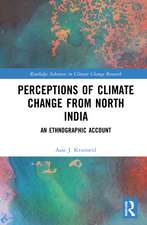Low Carbon Politics: A Cultural Approach Focusing on Low Carbon Electricity: Routledge Studies in Energy Policy
Autor David Tokeen Limba Engleză Hardback – 5 apr 2018
Egalitarian pressures have had a profound influence on technological outcomes, not merely in securing the deployment of renewable energy but also in increasing the costs of nuclear power. Whereas in the 1970s it might have been expected that individualist, market based pressures allied to dominant hierarchies would deliver nuclear power as the main response to problems associated with fossil fuels, a surprising combination has emerged. Egalitarian and individualist pressures are, together, leading to increasing levels of deployment of renewable energy. This work finds that electricity monopolies tend to favour nuclear power whereas competitive arrangements are more likely to lead to more renewable energy being deployed. It covers developments in a number of countries including USA, UK, China, South Africa and also Germany and Denmark.
This book will be of great relevance to students, academics and policymakers with an interest in energy policy, low carbon politics and climate change.
| Toate formatele și edițiile | Preț | Express |
|---|---|---|
| Paperback (1) | 389.38 lei 6-8 săpt. | |
| Taylor & Francis – 12 dec 2019 | 389.38 lei 6-8 săpt. | |
| Hardback (1) | 997.11 lei 6-8 săpt. | |
| Taylor & Francis – 5 apr 2018 | 997.11 lei 6-8 săpt. |
Din seria Routledge Studies in Energy Policy
-
 Preț: 289.19 lei
Preț: 289.19 lei -
 Preț: 449.41 lei
Preț: 449.41 lei -
 Preț: 449.41 lei
Preț: 449.41 lei -
 Preț: 396.29 lei
Preț: 396.29 lei -
 Preț: 322.97 lei
Preț: 322.97 lei - 13%
 Preț: 323.91 lei
Preț: 323.91 lei -
 Preț: 449.41 lei
Preț: 449.41 lei -
 Preț: 449.41 lei
Preț: 449.41 lei - 18%
 Preț: 144.26 lei
Preț: 144.26 lei -
 Preț: 385.92 lei
Preț: 385.92 lei -
 Preț: 389.38 lei
Preț: 389.38 lei -
 Preț: 389.38 lei
Preț: 389.38 lei -
 Preț: 389.00 lei
Preț: 389.00 lei -
 Preț: 416.22 lei
Preț: 416.22 lei -
 Preț: 382.65 lei
Preț: 382.65 lei -
 Preț: 389.07 lei
Preț: 389.07 lei -
 Preț: 387.75 lei
Preț: 387.75 lei -
 Preț: 389.66 lei
Preț: 389.66 lei -
 Preț: 381.98 lei
Preț: 381.98 lei - 17%
 Preț: 259.98 lei
Preț: 259.98 lei - 17%
 Preț: 259.98 lei
Preț: 259.98 lei - 18%
 Preț: 1005.80 lei
Preț: 1005.80 lei -
 Preț: 384.27 lei
Preț: 384.27 lei - 18%
 Preț: 1000.27 lei
Preț: 1000.27 lei
Preț: 997.11 lei
Preț vechi: 1215.98 lei
-18% Nou
Puncte Express: 1496
Preț estimativ în valută:
190.81€ • 197.14$ • 158.72£
190.81€ • 197.14$ • 158.72£
Carte tipărită la comandă
Livrare economică 19 martie-02 aprilie
Preluare comenzi: 021 569.72.76
Specificații
ISBN-13: 9781138696778
ISBN-10: 1138696773
Pagini: 182
Ilustrații: 3 Line drawings, black and white; 10 Tables, black and white; 3 Illustrations, black and white
Dimensiuni: 156 x 234 x 13 mm
Greutate: 0.36 kg
Ediția:1
Editura: Taylor & Francis
Colecția Routledge
Seria Routledge Studies in Energy Policy
Locul publicării:Oxford, United Kingdom
ISBN-10: 1138696773
Pagini: 182
Ilustrații: 3 Line drawings, black and white; 10 Tables, black and white; 3 Illustrations, black and white
Dimensiuni: 156 x 234 x 13 mm
Greutate: 0.36 kg
Ediția:1
Editura: Taylor & Francis
Colecția Routledge
Seria Routledge Studies in Energy Policy
Locul publicării:Oxford, United Kingdom
Public țintă
PostgraduateCuprins
Chapter 1 - Introduction
Chapter 2 - Setting out cultural theory
Chapter 3 - Culture, Ecology and Energy
Chapter 4 - Science, Climate Politics and Cultural Bias
Chapter 5 - The importance of egalitarianism
Chapter 6 - The USA
Chapter 7 - The UK
Chapter 8 - China
Chapter 9 - South Africa
Chapter 10 - Conclusion
Chapter 2 - Setting out cultural theory
Chapter 3 - Culture, Ecology and Energy
Chapter 4 - Science, Climate Politics and Cultural Bias
Chapter 5 - The importance of egalitarianism
Chapter 6 - The USA
Chapter 7 - The UK
Chapter 8 - China
Chapter 9 - South Africa
Chapter 10 - Conclusion
Notă biografică
David Toke is a Reader in Energy Politics at the University of Aberdeen, UK. He has written 50 papers in refereed journals and is author of seven books, including China’s Role in Reducing Carbon Emissions. He has been a Principal or co-investigator of a number of funded projects resourced by the EU, ESRC, Leverhulme Trust and British Academy.
Descriere
This book uses cultural theory to demonstrate how policy preferences and action in support of renewable energy and nuclear power are heavily influenced by cultural factors. This book will be of great relevance to students, academics and policymakers with an interest in energy policy, low carbon politics and climate change.



![The Encyclopedia of Global Warming Science and Technology: [2 volumes]](https://i2.books-express.ro/bt/9780313377020/the-encyclopedia-of-global-warming-science-and-technology.jpg)



















